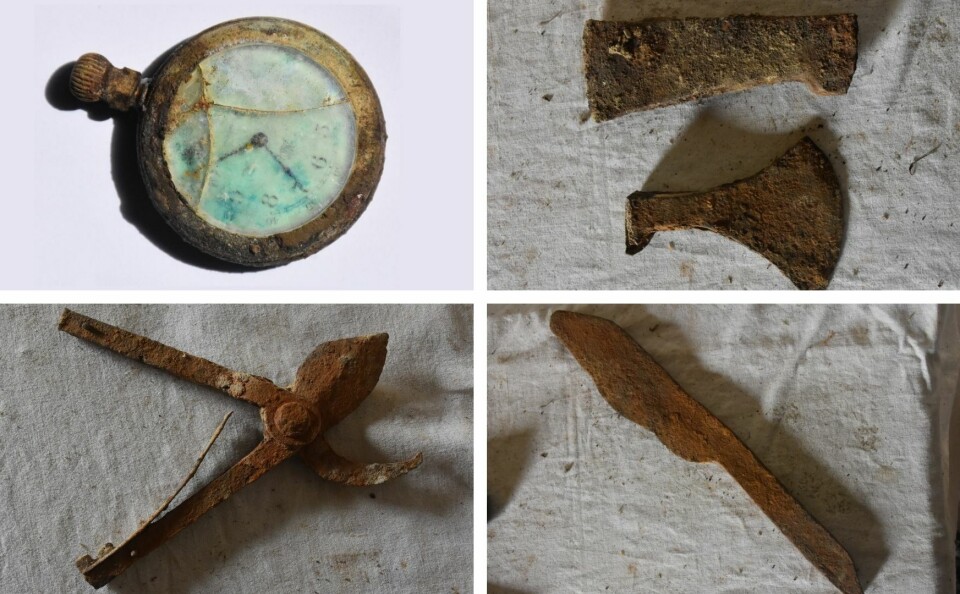-
How to deal with asbestos in France
As the material ages, it degrades - becoming more likely to release harmful fibres
-
How I reinforced my barn's 150-year-old timber beams
Columnist Nick Inman shares his experiences restoring an old French farmhouse
-
The five other capitals of France before Paris
Several other cities have held the honour for various reasons
French farmhouse renovation unearths tools that tell everyday history
Writer Nick Inman would rather dig up an ox-drawn plough blade than a Roman mosaic - and enlists the local heritage association to help

When I dig a hole almost anywhere on my property, but especially in the earth floors of the barns, I know I am going to find one of two things.
Mostly, I disinter rounded stones (galets) of all sizes, which were washed down from the Pyrenees by prehistoric torrents and deposited on the valley floor.
What I am always on the look-out for, however, are traces of human activity: signs that someone has been here before me thinking his/her thoughts and dreaming dreams.
For two centuries, this was a working farm of an ecological efficiency that we can only envy. Nothing went to the déchetterie because there wasn’t one.
Read more: Dordogne: Do I need a special card to make a visit to the tip?
Discarded items were simply thrown into a corner and forgotten about.
Anything compostable has long since vanished but many items on the farm were made of tough stuff and they have waited around for me to come along with my insatiable curiosity.
Objects tell story of ordinary life
My guilty secret is this: discovering treasure is the great by-product of doing DIY in rural France. I do not mean gold coins and Roman mosaics. Better by far is the collection of folk museum exhibits beneath my feet.
What interests me are not the items used by the rich and fancy, but the stuff of ordinary life. These are, as any modern artist would call them, ‘found objects’ that deserve to be catalogued and displayed.
Even a fragment of something or other has its story to tell. That is, if I can figure out what the object actually is.
This is where Joel comes in. He is the president of our local heritage association and has great practical general knowledge.
I might scratch my head for a year or two trying to figure out the purpose of a piece I have found but he can often put a name to it in seconds.
Rusty old iron feels like treasure
Most of the objects I uncover are made of iron: rusty and caked in soil but often still perfectly recognisable. This, at least, tells me they predate the introduction of steel.
I have found lots of spikes that were banged into the walls as pegs for tying up animals.
Hand tools are some of my favourite finds, as are parts of obsolete machinery.
There is something magical about holding the leading blade of an ox-drawn plough in my hand and realising this lump of metal was once vital for the subsistence of more than one family.
When I find a bit of old metal, I do my best to clean it up with a wire brush but I do not mind if it still looks rusty. That is part of its present character.
I could perhaps apply rust remover and paint, but I do not want the piece to lose its authentic historical quality.
Read more: ‘Restoring a medieval chateau in France is more than lifetime project’
What will our lost objects say about us?
I know – you do not have to tell me – that this is a bit of a nerdish hobby, but I do not care.
Not everyone shares my fascination with the old. I see it as a form of time travel in two directions. An axe head sends me back a hundred years or more, but archaeology is also a reminder that there is a future.
I cannot help thinking, as I wander around losing tools and other DIY items (I can be a bit absent-minded like the best of people), whether anyone will find them in a few centuries’ time and try to reconstruct my life in the quaint 21st century.
Now where did I leave that tape measure..?
Related articles
Gold coins found with junk in rundown French house sell for €772,000
Rising construction costs in France: Should you delay renovations?
Explained: How to apply for a renovation grant for your French home
























